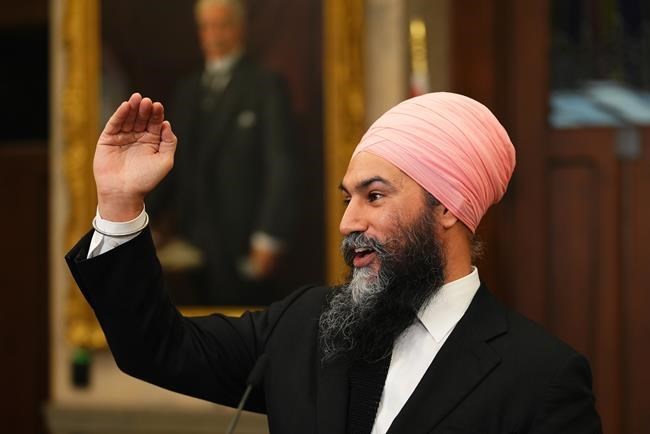OTTAWA — The Liberals have done enough to honour their agreement with the NDP, but that doesn't mean the federal budget will pass without opposition.
"We still have critiques and criticisms," NDP Leader Jagmeet Singh said Thursday. "We're concerned, deeply concerned, about the approach on the environment."
He said the government should be spending more on clean energy instead of giving subsidies to fossil fuel companies.
The New Democrats held to that position in question period on Friday, with Quebec MP Alexandre Boulerice saying in French that billions in subsidies to oil and gas companies and the approval of the Bay du Nord project in Newfoundland shows the Liberals think they can solve the climate crisis by giving more money to the fossil fuel sector.
He called for funding for green jobs, a sentiment echoed by Alberta NDP MP Heather McPherson, who demanded clean-jobs training for her province's workers and legislation on a just transition to a green economy.
Natural Resources Minister Jonathan Wilkinson responded that there Is significant funding for Alberta and other Prairie Provinces to diversify their economies as well as $4 billion to grow the critical-minerals sector.
"We are going to be working actively with the province of Alberta and with industry to ensure that we are moving forward in a manner that will create a clean economy, a prosperous economy and one that will support workers and communities to make this transition," he said.
Conservatives, for their part, focused on hefty spending promises in the budget that they assert will grow inflation and make it harder for Canadians to enter and remain in the middle class. Finance critic Ed Fast accused the government of tabling a "tax and spend" budget.
"Every day we ask this government what it's doing to make life more affordable for Canadians and every day they tell us how much money they're spending," he said. "It's not how much money you spend. It's about the results you deliver, and by that standard this government has failed."
Rachel Bendayan, associate minister of finance, replied that her government's investments were delivering results, pointing to Statistics Canada jobs numbers released Friday that showed the country's unemployment rate dropped to a low not seen since the late 1970s.
Friday is the first of four days of debate on the government motion concerning the budget. The Conservatives will have first crack at amending it, the Bloc Québécois second. Both parties have indicated they'll be voting against the Liberals.
The leaders of the Green party and Bloc Québécois have also heaped criticism on the budget's environmental promises.
Amita Kuttner said Thursday the plan to get to net-zero is not enough to meet Canada's emissions reduction targets and the Greens wanted the budget to centre on climate change in every policy area.
Yves-François Blanchet, for his part, said he thinks the Liberals intend to be "the instrument" of the oil and gas industry.
"The difference between this government and the Conservatives is the Conservatives would admit it," Blanchet said Thursday.
Three of the four opposition parties are praising the Liberals' emphasis on housing.
Finance Minister Chrystia Freeland said the commitment to double the number of homes built annually over the next decade is the "landmark ambition" of this budget.
The $14 billion in new spending on housing also includes a two-year ban on foreign buyers, targeted funding for municipalities to build affordable housing and money to double the first time homebuyers' tax credit.
Kuttner said the Greens were "very happy to see the promise of 6,000 units" of co-operative housing.
Singh said his party forced the Liberals to reconsider what the government considers to be affordable housing. It's now calculated at 80 per cent of the average market rate rather than 80 per cent of median income, a definition that "would have resulted in not-affordable housing."
Interim Conservative leader Candice Bergen said Thursday the Official Opposition didn't find what it was looking for in the housing plan.
"It is a typical, classic NDP spend-and-tax budget," she said at a news conference.
The Tories have spent the last several weeks in question period referring to Thursday as the release of Canada's first NDP budget, demanding to know whether the Liberals would give in to the NDP's "extreme demands."
Bergen said the Liberals have "lost their way," leaning further to the left.
"The Liberals that we knew even 10 years ago ceased to exist."
The Conservatives were happy to see more than $8 billion directed toward the defence budget. They put forward a motion in the House of Commons earlier this week to raise defence spending to two per cent of Canada's GDP, a significant increase that NATO allies have been calling for.
The budget plan will raise spending to 1.5 per cent, according to finance officials.
That piece of the plan isn't sitting well with the Liberals' main dance partner, but it isn't enough to cause the confidence and supply deal to collapse.
That means when Parliament resumes sitting after a two-week break, the government can breathe easy knowing it has the numbers to survive any confidence votes on the budget motion.
Government House leader Mark Holland said debate will continue on April 25, 26 and 27.
After that, the budget implementation bill will be up for a debate of its own.
This report by The Canadian Press was first published April 8, 2022.
Sarah Ritchie, The Canadian Press



